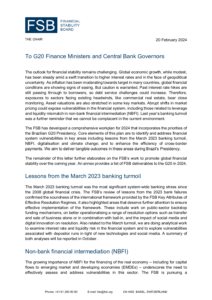Press enquiries:
+41 61 280 8477
[email protected]
Ref: 4/2024
-
FSB Chair warns of challenging outlook to global financial stability including debt servicing burdens, stretched asset valuations in some key markets, and leverage and liquidity mismatch in non-bank financial intermediation (NBFI).
-
Chair submits FSB’s revised policy recommendations to address vulnerabilities arising from liquidity mismatch in OEFs and calls on G20 members to implement them as quickly as feasible.
-
Letter outlines key issues the FSB is working on in 2024, including lessons from the March 2023 banking turmoil, NBFI, climate change, digitalisation and enhancing the efficiency of cross-border payments.
The Financial Stability Board (FSB) today published a letter from its Chair, Klaas Knot, to G20 Finance Ministers and Central Bank Governors, ahead of the G20 meeting on 28-29 February.
In his letter, he warns of the challenging outlook for global financial stability, despite steady economic growth and signs of easing global financial conditions. Debt service challenges could increase, and exposures to sectors facing existing headwinds, like commercial real estate, bear close monitoring. Asset valuations are also stretched in some key markets. Abrupt shifts in market pricing could expose vulnerabilities in the financial system, including those related to leverage and liquidity mismatch in NBFI.
The letter lays out the FSB’s work during 2024 to monitor and address financial system vulnerabilities.
The FSB will work to ensure the effective implementation of the international framework provided by the FSB Key Attributes of Effective Resolution Regimes, address the financial stability risks stemming from leverage in NBFI, and analyse the financial stability implications of tokenisation and artificial intelligence. To address growing financial stability risks from cyber incidents, the FSB is designing a format for incident reporting exchange (FIRE) for public consultation.
The FSB will continue to coordinate international work through the FSB Roadmap to address financial risks from climate change, the G20 Roadmap for enhancing cross-border payments and the G20 Roadmap on crypto-assets. At the request of the Brazilian G20 Presidency, the FSB will also deliver a stocktake on regulatory and supervisory initiatives related to the identification and assessment of nature-related financial risks to the G20 July meeting.
Notes to editors
The FSB coordinates at the international level the work of national financial authorities and international standard-setting bodies and develops and promotes the implementation of effective regulatory, supervisory, and other financial sector policies in the interest of financial stability. It brings together national authorities responsible for financial stability in 24 countries and jurisdictions, international financial institutions, sector-specific international groupings of regulators and supervisors, and committees of central bank experts. The FSB also conducts outreach with approximately 70 other jurisdictions through its six Regional Consultative Groups.
The FSB is chaired by Klaas Knot, President of De Nederlandsche Bank. The FSB Secretariat is located in Basel, Switzerland and hosted by the Bank for International Settlements.
